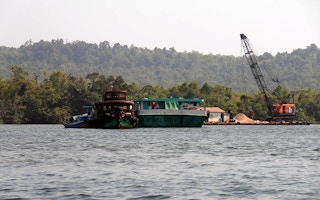Cambodia’s government on Friday dismissed accusations by an environmental group that the country is still exporting sand, despite a national ban, saying a vessel seen loading the material in a video the group posted on social media was doing nothing illicit.
On May 1, the NGO Mother Nature Cambodia posted a video to its Facebook page purportedly showing a vessel named the Deryoung Sunflower loading white sand for export in Sihanouk province’s Stung Hav district two days earlier.
On Friday, Cambodia’s Ministry of Mines and Energy said in a statement that Mother Nature did not accurately identify the vessel or its location in the video, and also gave the wrong time for when the video was taken.
It said the video claimed the vessel could carry up to 30,000 tonnes, while the Deryoung Sunflower can only load up to 8,679 tonnes, and that the Deryoung had left Cambodia on May 1 after gathering silica sand for producing glass, while the video was likely filmed afterwards.
The ministry banned sand exports in November 2016 after public outrage over large inconsistencies between Cambodia’s recorded sand exports and Singapore’s recorded sand imports from Cambodia, but has recently said that silica sand was not part of the ban.
“
If we report sand exporting activities to the ministry, it will tell the owner of the vessels to destroy the evidence. The ministry has a record of collusion with criminals to destroy natural resources.
Alejandro Gonzalez-Davidson, director, Mother Nature Cambodia
Alejandro Gonzalez-Davidson, director of the NGO Mother Nature Cambodia, on Friday told RFA’s Khmer Service that the ministry’s response was “an excuse” and suggested that sand exports are continuing, despite the ban.
“We have collected ample evidence and I will absolutely not stop posting the videos on Facebook as the ministry has asked,” said the Spanish environmentalist, who was expelled from Cambodia in February 2015 after leading a campaign against a controversial dam and placed on a black list that prevents his return to the country.
“If we report sand exporting activities to the ministry, it will tell the owner of the vessels to destroy the evidence. The ministry has a record of collusion with criminals to destroy natural resources,” he said.
“By posting such activities on Facebook, we hope we can keep people informed and that it will lead to some sort of resolution.”
In the meantime, Gonzalez-Davidson said, the Deryoung Sunflower had arrived in Taiwan Friday with its cargo.
“The Taiwanese authorities told reporters that the sand was imported from Cambodia,” he said.
“We believe that the Deryoung Sunflower has stolen sand from Cambodia and we will do our best to pressure the Taiwanese authorities to take action against such illegal activities.”
The Phnom Penh Post quoted officials in Taiwan on Thursday confirming that the Deryoung was carrying sand to the country’s Port of Taichung, but said the sand was silica.
The Post was unable to confirm what kind of sand a second ship, identified by Mother Nature as being named Ocean Beauty, was carrying.
The paper also quoted Gonzalez-Davidson calling the government’s recent claim that silica sand was not part of the ban on exports “a pathetic lie,” adding that the type of sand on the Deryoung was “totally irrelevant.”
Mong Reththy Group Co Ltd and Silica Services Cambodge are two licensed companies that received recent approval for exports of silica sand, but the Post reported that the locations of departure and the names of the boats did not match those of Ocean Beauty or the Deryoung Sunflower.
Reported by Sonorng Kher for RFA’s Khmer Service. Translated by Nareth Muong. Written in English by Joshua Lipes.
Copyright © 1998-2014, RFA. Used with permission of Radio Free Asia, 2025 M St. NW. Suite 300, Washington DC 20036.










